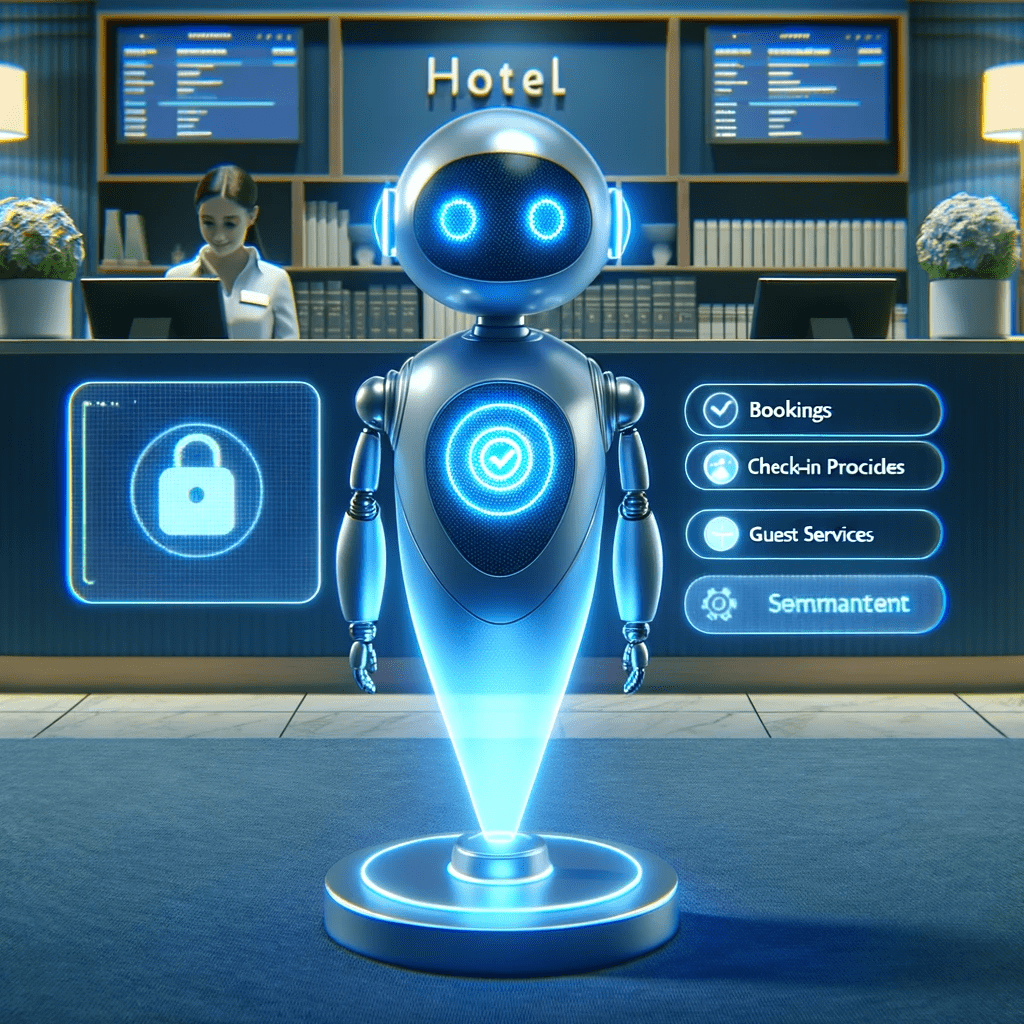As Artificial Intelligence (AI) continues to make significant inroads across various industries, its potential in the hotel sector is particularly promising. The integration of AI promises not only enhanced operational efficiencies but also a redefined guest experience that was once the stuff of science fiction.
In this article we will describe some of the future (or current) implementations of AI on the Hospitality sector and some of their main characteristics.
Table of Contents
Personalizing the Guest Experience
Today’s hotel industry is witnessing an unprecedented shift in guest service, and LLMs are at the forefront of this transformation. By analyzing vast amounts of textual data, LLMs can understand intricate guest preferences and feedback. Whether it’s sifting through online reviews to gauge common concerns or analyzing guest queries, these models provide deep insights into what guests truly desire.
For instance, a guest might mention their preference for a sea-facing room with a balcony in an email. An LLM can quickly process this information, ensuring that the guest’s stay is tailored to this specific request. Beyond room preferences, LLMs can be integrated into hotel apps or websites to offer real-time suggestions. If a guest is reading about the hotel spa, the LLM can recommend specific treatments or offer package deals, enhancing the guest’s browsing experience and increasing the chances of a booking.
Reference Models: Today’s AI realm boasts a plethora of advanced models and frameworks, here are a few of them:
- OpenAI’s GPT Series: Renowned for setting benchmarks in natural language processing and offering a wide range of applications.
- Bard – Chat Based AI Tool from Google, Powered by PaLM 2.
- LLaMA: A foundational, 65-billion-parameter large language model from META.
- Falcon LLM, is a foundational LLM equipped with 40 billion parameters
As guests continue to interact with these systems, the LLM learns and adapts, ensuring that returning guests find the system even more attuned to their preferences. This ongoing learning process ensures that every interaction is a step towards crafting the ultimate personalized guest experience.
Chatbots and Virtual Assistants
In an age where instant communication is not just preferred but expected, chatbots and virtual assistants are becoming indispensable tools for hotels worldwide. These AI-driven interfaces provide guests with immediate responses, bridging the gap between guest needs and hotel services.

Seamless Reservations
Gone are the days of lengthy booking processes. Modern chatbots simplify reservations, guiding guests through available room options, prices, and amenities. They can even handle special requests, ensuring guests get exactly what they desire.
24/7 Guest Support
Whether it’s a late-night query about room service or an early morning airport shuttle request, virtual assistants are always available. This round-the-clock support ensures guests always have a helping hand, regardless of the hour.
Personalized Recommendations
Drawing from guest data and preferences, virtual assistants can offer tailored suggestions. Be it local attractions, dining options, or in-hotel amenities, these AI-powered assistants curate experiences that resonate with individual guests.
Multilingual Capabilities
For hotels catering to a global clientele, language barriers can be challenging. Modern chatbots, however, can engage guests in multiple languages, ensuring clear communication and enhancing guest satisfaction.
Feedback Collection
Post-stay feedback is invaluable. Virtual assistants can facilitate this process, prompting guests for reviews and feedback, which can be analyzed to further refine hotel services.
Integration with Other Systems
These AI interfaces are not standalone entities. They can integrate seamlessly with other hotel systems, from room automation controls to billing, ensuring a cohesive guest experience.
Price Optimization: Harnessing AI for Strategic Revenue Management
Dynamic Pricing
Gone are the days of static rate cards. AI systems can adjust room rates in real-time, considering factors like demand, local events, competitor prices, and historical data. This ensures that prices remain competitive while optimizing for profitability.
Predictive Analysis
AI can forecast future demand based on patterns, seasonality, and external factors. This foresight allows hotels to adjust their pricing strategies in advance, capitalizing on peak times and offering discounts during potential lulls.
Competitor Benchmarking
AI tools can continually monitor competitors’ prices, ensuring that a hotel’s rates are always competitive. Instead of manual checks, this automated process provides real-time insights and recommendations.
Group and Event Pricing
When handling group bookings or events, AI can provide dynamic packages and discounts based on size, duration, and other variables, ensuring profitable deals without underselling.
Yield Management Integration
AI seamlessly integrates with a hotel’s yield management system. This ensures that pricing strategies align with room availability, maximizing revenue per available room (RevPAR).
Personalized Pricing Offers
Using guest data, AI can craft personalized pricing offers, providing exclusive deals or packages tailored to individual guest preferences, enhancing the likelihood of conversions.
Real-time Reporting
With AI, hotels have access to real-time reporting on pricing performance, occupancy rates, and revenue generation. These insights enable hoteliers to make informed decisions quickly.
Targeted Marketing and Advertising: AI’s Role in Crafting Tailored Guest Outreach
In an era of information overload, personalized marketing has become the cornerstone of effective outreach. For the hotel industry, AI provides the tools to create marketing campaigns that truly resonate, ensuring that potential guests not only notice but also engage.
Data-Driven Personalization
The power of AI lies in its ability to sift through vast amounts of data to unearth actionable insights. By analyzing a guest’s previous stays, interactions with online ads, website behavior, and even social media activity, AI can pinpoint their preferences. This means marketing campaigns can be tailored to individual tastes. For instance, a family who often books sea-facing rooms might receive special package deals during the school holidays, while a business traveler could get tailored offers for conference room facilities or express check-ins. This level of personalization ensures that marketing messages hit the mark every time, leading to higher conversion rates.
Predictive Analysis for Campaign Timing
Timing is everything in marketing. With AI’s predictive analytics capabilities, hotels can forecast the best times to launch campaigns. This might involve analyzing patterns like early bird summer bookings or last-minute holiday travel rushes. Moreover, AI can predict when past guests are likely to plan their next trip based on their booking history. By aligning marketing campaigns with these predictions, hotels can ensure their offers reach potential guests exactly when they’re most receptive.
Enhanced Audience Segmentation
Traditional audience segmentation might group potential guests into broad categories like ‘business travelers’ or ‘families’. AI, however, takes segmentation to a whole new level. It can create micro-segments based on a combination of factors, such as travel history, spending patterns, and even responses to past marketing campaigns. A segment, for instance, might target “solo travelers who prefer spa services and have responded to winter getaway ads in the past.” With such precise segmentation, marketing campaigns become laser-focused, leading to increased engagement and return on investment.
Conclusion
The integration of Artificial Intelligence in the hotel sector represents a significant shift, enhancing both operational aspects and guest experiences. As AI crafts more personalized and efficient hospitality services, it’s clear that its role is pivotal in fostering meaningful connections with guests. In this evolving landscape, hotels embracing AI are positioned to redefine the essence of hospitality.


